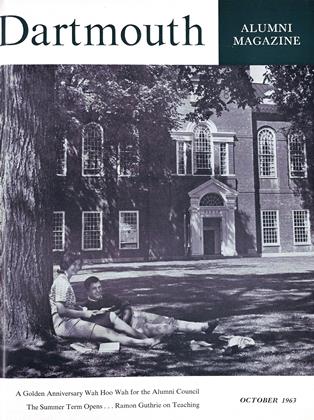Kent MacKenzie '51
KENT MACKENZIE '51 is a creative man with a strong social con. science — and a restless ambition to communicate through motion picture film what he sees before him and what seethes within him. For Mackenzie the camera lens is the brush, the rhythm of speech the colors, the alienation of men his subject. MacKenzie himself was on hand for the College's first opportunity to view the product of his mind and talents at a late May showing of "The Exiles" in the Hopkins Center's Spaulding Auditorium. The presentation was sponsored by the Dartmouth Film Society and its director, J. Blair Watson.
"The Exiles" is a feature-length film about American Indians who bear little resemblance to the redmen normally seen war-whooping across the silver screen. These are men and women who are displaced persons in their own land, Indians who have left the reservations to live, and be lost, in the frantic scramble of contemorary urban life. Filmed in downtown Los Angeles with "stars" who are actually re-enacting their own lives and improvising their own dialogue, the film follows a 22-year-old pregnant Apache girl and two young Indian males through a day and night of their harsh, hopelessly wild existence. It ends on a hill high above the city where they dance angrily until dawn.
As one might expect of a film well received at festivals in this country and Europe, including Mannheim, Germany, where it was awarded the coveted Golden Dukat as the best first feature film by a documentary director, "The Exiles" found a sympathetic audience in Hanover. The evidence that MacKenzie's preshowing talk and film gained audience favor was in the excited crowd of questioners, mostly students, around MacKenzie at the program's end. Sponsor Blair Watson felt the enthusiastic response grew from recognition of both the serious intent and the professional competence displayed in the film.
Writer-producer-director MacKenzie first became interested in film making at Dartmouth. For MacKenzie Hanover offered two classrooms, one within College walls where as an English major he was influenced strongly by Professor-Emeritus Benfield Pressey's laboratory course in motion picture writing. The other "classroom" was the Nugget Theater where it is reported MacKenzie saw nine film features a week.
Two years after graduation were spent as an aircraft control officer with the Air Force and by the end of this stint, MacKenzie had his goal firmly fixed before him. In October 1953 he arrived in Hollywood in a second-hand car with $40 - and determination. He began by working days in a greeting card factory and studying nights at the University of Southern California's cinema department. Later with the help of the GI Bill and a scholarship he became a full-time student of the film art. Honors first came his way in 1956. As a graduate project he made a short film, "Bunker Hill," a sympathetic comment on the problems of elderly pensioners, and the film won the Silver Award for university productions in a contest sponsored by Look magazine and the Screen Producers Guild.
Leaving U.S.C. he took a job at Parthenon Studios in Los Angeles where he was hired by producer Charles "Cap" Palmer '23 to edit and direct industrial films. MacKenzie worked on more than a score of product documentaries but the story of American Indians in Los Angeles' skid row neighborhood was growing - in his mind and in his notebooks as his research took him to reservations in Arizona, to Indian agents and authorities, and, of course, back into the harsh neighborhoods of Los Angeles where the people he would film lived.
By January 1958 he had found and persuaded his three major characters to play themselves, and with their help he fashioned his story line. He put his entire bankroll — $539 - into the project and gathered together a crew of volunteers, many like himself working in varied jobs on industrial and educational films. Although money was a consistent problem, there were many other problems too. Two of his cameramen went into the Army and some of his supporting cast were thrown into jail.
By the time the filming was completed "The Exiles" had cost $45,000, and the money had come from everywhere and anywhere. MacKenzie's 85-year-old barber sold a racehorse to raise $1500, and a Pasadena patroness of the arts turned over the intended payment on a new Mercedes. It took three years and four months before the first answer print - running time 77 minutes - was ready in April 1961. "The Exiles" went from there to the festivals and ever-increasing recognition of its worth at film society and university showings such as the May program in Hopkins Center.
Kent MacKenzie '51 (r) talks shop with Blair Watson (l), Director of the FilmSociety, and Thomas MacCary '63, 1962-63 Student Director of the Film Society.
 View Full Issue
View Full Issue
More From This Issue
Features
-
 Feature
FeatureTrustees Meet with Alumni Council
FEBRUARY 1968 -
 Cover Story
Cover StoryCOMMENCEMENT
June • 1985 -
 Feature
FeatureA Scientific Centennial for Dartmouth
OCTOBER 1969 By ALLEN L. KING -
 FEATURES
FEATURES“We Are Your Only Hope”
MAY | JUNE 2023 By Jennifer Wulff ’96 -
 Cover Story
Cover StoryParadise Regained
MARCH 1995 By Jere Daniell '55 -
 Cover Story
Cover StoryVanderlust
SEPTEMBER | OCTOBER 2020 By Svati Kirsten Narula ’13







